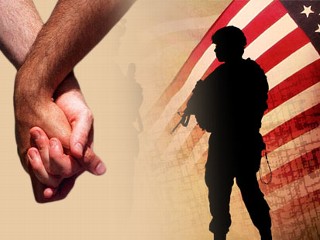| Author
|
Post |
 
|
|
Steve Myers
Site Admin


|

Being Gay has been grounds for discharge for the military since the Revolutionary War. But it wasnt until 1942 that the military first implemented a psychiatric screening to the recruiting process. If a person was to be found gay they were rejected because homosexuality was considered a mental disorder. At that time military members found to be gay were given a court martial, imprisoned and discharged from the military.
In 1944 the military implemented a new policy that gays were to be committed to a military hospital for examination by a physiatrist and later discharged from the military.
In 1947 two new classifications were created: "general" and "undesirable". Under the new system, a military member found to be gay but who had not committed any sexual acts while in service would tend to receive an undesirable discharge. Those found guilty of engaging in sexual conduct were usually dishonorably discharged.
In 1993 President Bill Clinton signed Dont Ask Dont Tell into law. The full name of the policy at the time was "Dont Ask, Dont Tell, Dont Pursue."
Dont Ask means the military or appointed officials will not ask or require military members to disclose their sexual orientation.
Dont Tell means military members may be discharged for claiming to be gay or bisexual or for making statements indicating that they have a tendency toward or intend to engage in gay activities.
Do not Pursue establishes what is minimally required for an investigation to be initiated.
"Dont Harass", this provision was added to the policy later. It ensures that the military will not allow harassment or violence against military members for any reason.
In December of 2010 President Barack Obama signed the repeal of the militarys Dont Ask Dont Tell policy. President Obama directed the military to start working on policies to allow gay military members to serve openly in the military. The new policies are expected to take effect in the middle of 2011.
Citing the article How will the US military treat gay married
members?" By Katie Connolly published 28 January 2011
(BBC News Washington D.C.)
http://www.bbc.co.uk/news/world-us-canada-12304140
Defense Secretary Robert Gates announced on Thursday that the Pentagon would be ready to implement the repeal within 60 days of receiving the president's certification that the inclusion of gay members would not hinder the battle readiness of the US military.
Since Congress passed the repeal in December, a Pentagon working group has been analyzing the changes that must be made, including recruitment policies and training the force.
Rolling out the new procedures for recruitment and training is expected to take until mid-2011.
But one area remains tricky, and potentially volatile: how will the spouses of legally married gay service members be treated?
The short answer is: not at all. For now, the military won't be officially recognizing gay marriage as equal to straight marriage.
Hands are tied
Same sex marriage is legal in five US states and in the District of Columbia. Three other states recognize those marriages.
(Katie Connolly BBC News Washing D.C.)
The article explains the issues the military will have to deal with in order to except gays into the military, but what compromises the state have to make?
When a gay couple moves to a state that does not currently recognize gay marriage will that state be force to recognize the marriage?
When a gay couple separated form the military and chooses to live in a state does not currently recognize gay marriage will that state be force to recognize the marriage?
When gay couple is stationed in a foreign country will that country be expected to afford that same right to a gay couple as they do to a heterosexual couple?
In my opinion these questions and more have to be and more must be answered before the military moves forward with this issue.
This issue could be used as an end run around state rights. By congress using the military to force states to except gay marriage may be very questionable constitutional grounds.
I can see this issue becoming the next big issue, like heath care.
And like heath care this issue may end up in the Supreme Court. |
_________________
Steve Myers |
|
 Sun Feb 06, 2011 1:46 pm
Sun Feb 06, 2011 1:46 pm |
|
|
untanglingwebs
El Supremo
|
You have raised some issues that I have never considered. While I support the rights of homosexuals in the military, I never really thought about gay marriages in that context.
Your summation was well thought out and insightful. It is certainly "food for thought". |
|
|
 Thu Feb 10, 2011 7:17 am
Thu Feb 10, 2011 7:17 am |
|
|
|
 FlintTalk.com Forum Index
> Political Talk
FlintTalk.com Forum Index
> Political Talk